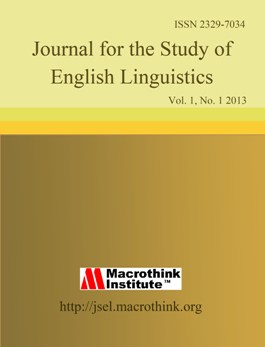Gendered Identities and Practices in the Jordanian-Turkish Community in Jordan: A Sociolinguistic Perspective
DOI:
https://doi.org/10.5296/jsel.v11i1.20747Keywords:
gendered identity, language proficiency, language shift, and linguistic repertoiresAbstract
This paper aims to provide a sociolinguistic investigation of gendered identities and practices among some third-generation Jordanian Turks. It researches into language proficiency, use, and identity of Jordanian Turks of both sexes. A mixed methods approach was chosen, drawing upon a combination of quantitative and qualitative data captured through two methods: sociolinguistic questionnaires and semi-structured interviews. The data analysed in this study provide evidence that the female members of the Jordanian-Turkish community, whose linguistic repertoires are comparatively more bilingual than male counterparts, are undergoing a language shift in progress, and the male members, on the whole, are monolingual language users and have therefore shifted their language practices and only sustained ritualised cultural practices.




